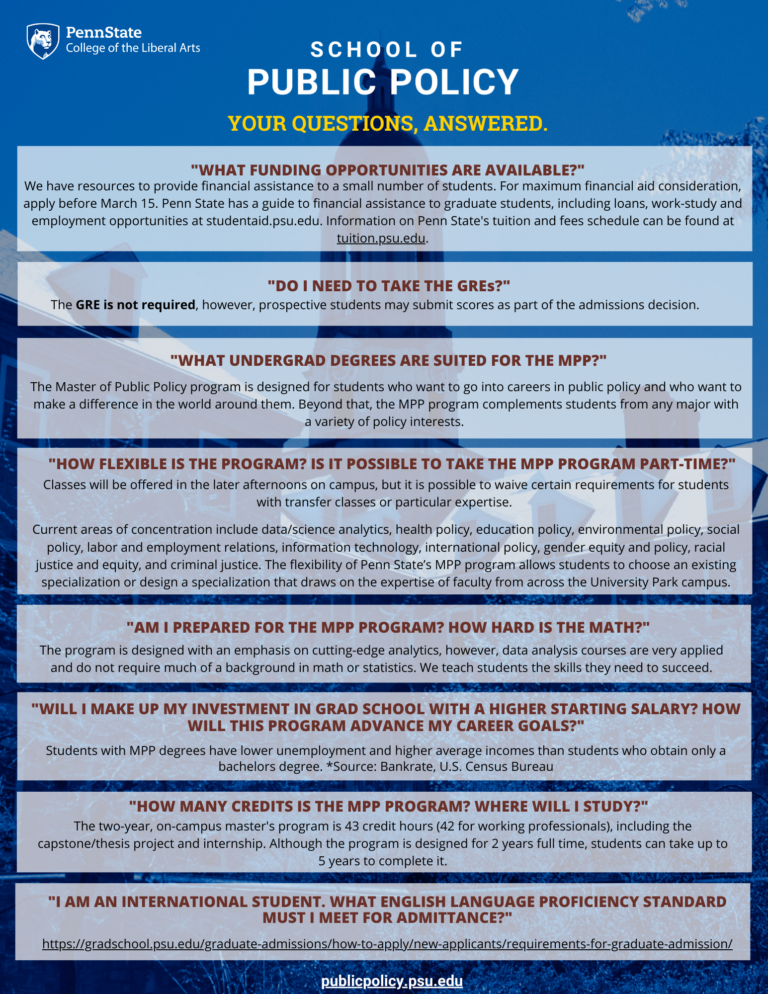“WHAT FUNDING OPPORTUNITIES ARE AVAILABLE?”
We have resources to provide financial assistance to a small number of students. For maximum financial aid consideration, be sure to apply before March 15.
Penn State has a guide to financial assistance to graduate students, including loans, work-study and employment opportunities at studentaid.psu.edu. Information on Penn State’s tuition and fees schedule can be found at tuition.psu.edu.
“DO I NEED TO TAKE THE GREs?”
The GRE is not required, however, prospective students may submit scores to be considered as part of the admissions decision. Learn more about the application process on our application page.
“WHAT UNDERGRAD DEGREES ARE SUITED FOR THE MPP?”
The Master of Public Policy program is designed for students who want to go into careers in public policy and who want to make a difference in the world around them. Beyond that, the MPP program complements students from any major with a variety of policy interests. Read more about concentrations and curriculum.
“HOW FLEXIBLE IS THE PROGRAM? IS IT POSSIBLE TO TAKE THE MPP PROGRAM PART-TIME?”
Classes will be offered in the later afternoons on campus, but it is possible to waive certain requirements for students with transfer classes or particular expertise.
Current areas of concentration include data/science analytics, health policy, education policy, environmental policy, social policy, labor and employment relations, information technology, international policy, gender equity and policy, racial justice and equity, and criminal justice. The flexibility of Penn State’s MPP program allows students to choose an existing specialization or design a specialization that draws on the expertise of faculty from across the University Park campus.
“AM I PREPARED FOR THE MPP PROGRAM? HOW HARD IS THE MATH?”
Penn State’s MPP program is designed with an emphasis in cutting-edge analytics, however, data analysis courses are very applied and do not require much of a background in math or statistics, as we plan to teach students the skills that they need to succeed.
“WILL I MAKE UP MY INVESTMENT IN GRAD SCHOOL WITH A HIGHER STARTING SALARY? HOW WILL THIS PROGRAM ADVANCE MY CAREER GOALS?”
Students with MPP degrees have lower unemployment and higher average incomes than students who obtain only a bachelor’s degree. Learn more about career opportunities for MPP graduates on our Careers page.
*Source: Bankrate, U.S. Census Bureau
“HOW MANY CREDITS IS THE MPP PROGRAM? WHERE WILL I STUDY?”
The two-year, on-campus master’s program is 43 credit hours (42 hours for working professionals), including the capstone/thesis project and internship. Although the program is designed for 2 years full-time, students can take up to 5 years to complete it.
“I AM AN INTERNATIONAL STUDENT. WHAT ENGLISH LANGUAGE PROFICIENCY STANDARD MUST I MEET FOR ADMITTANCE INTO THE MPP PROGRAM?”

